Molecular shapes - Study guides, Study notes & Summaries
Looking for the best study guides, study notes and summaries about Molecular shapes? On this page you'll find 486 study documents about Molecular shapes.
Page 4 out of 486 results
Sort by
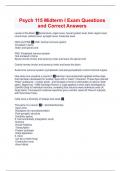
-
Psych 115 Midterm I Exam Questions and Correct Answers
- Exam (elaborations) • 55 pages • 2024
-
- R308,35
- + learn more
Levels of the Brain Social level, organ level, neural system level, brain region level, circuit level, cellular level, synaptic level, molecular level CNS and PNS CNS: Central nervous system Encased in bone Brain and spinal cord PNS: Peripheral nervous system Not encased in bone Spinal nerves (motor and sensory) enter and leave the spinal cord Cranial nerves (motor and sensory) enter and leave the brain. Autonomic nervous system (sympathetic and parasympathetic) control internal organs How ...

-
Purdue Chem 115 - Final Exam 70+ COMPILED Questions and Answers 2024
- Exam (elaborations) • 16 pages • 2024
-
- R163,16
- + learn more
Valence Bond Theory - A model that attempts to reconcile the shapes of molecules with those of atomic orbitals through the concepts of orbital overlap and hybridization (429). hybridization - a postulated process of orbital mixing to form hybrid orbitals (430). hybrid orbitals - an atomic orbital postulated to form during binding by the mathematical mixing of specific combinations of nonequivalent orbitals on a given atom (430). sp hybrid orbital - an orbital formed by the mixing of one s...
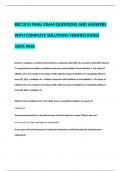
-
BSC1010 FINAL EXAM QUESTIONS AND ANSWERS WITH COMPLETE SOLUTIONS VERIFIED RATED 100% PASS
- Exam (elaborations) • 18 pages • 2024
- Available in package deal
-
- R208,53
- + learn more
BSC1010 FINAL EXAM QUESTIONS AND ANSWERS WITH COMPLETE SOLUTIONS VERIFIED RATED 100% PASS Enzyme Z catalyzes a reaction that transforms a substrate called ZEE into a product called ZED. Enzyme Z is regulated by two different inhibitor molecules called inhibitor W and inhibitor X. The shape of inhibitor W is very similar to the shape of ZEE while the shape of inhibitor X is completely different from ZEE, ZED, or inhibitor W. t inhibitor molecules called inhibitor W and inhibitor X. The shape o...
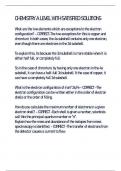
-
AQA CHEMISTRY A LEVEL WITH COMPLETE SOLUTIONS covalent bond - ANSWER-a shared pair of electrons between non-metal elements co-ordinate bond - ANSWER-a shared pair of electrons where both electrons are supplied by one atom repulsion in shapes of molecu
- Exam (elaborations) • 70 pages • 2024
- Available in package deal
-
- R362,80
- + learn more
AQA CHEMISTRY A LEVEL WITH COMPLETE SOLUTIONS covalent bond - ANSWER-a shared pair of electrons between non-metal elements co-ordinate bond - ANSWER-a shared pair of electrons where both electrons are supplied by one atom repulsion in shapes of molecules - ANSWER-Lone pair-lone pair > lone pair-bonding pair > bonding pair-bonding pair electronegativity - ANSWER-the power of an atom to attract the pair of electrons in a covalent bond hess' law - ANSWER-Total enthalpy chang...
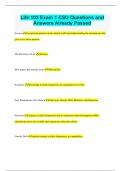
-
Life 103 Exam 1 CSU Questions and Answers Already Passed
- Exam (elaborations) • 26 pages • 2024
- Available in package deal
-
- R181,31
- + learn more
Life 103 Exam 1 CSU Questions and Answers Already Passed Science recognizing patterns in the natural world and understanding the mechanisms that give rise to those patterns The Diversity of Life Patterns How plants and animals work Mechanisms Evolution the change in allele frequencies in a population over time Four Mechanisms of Evolution Selection, Genetic Drift, Mutation, and Migration Selection changes in allele frequencies due to organisms with advantageous alleles rep...
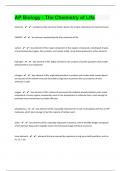
-
AP Biology - The Chemistry of Life 116 Questions with 100% Correct Answers | Verified | Latest Update
- Exam (elaborations) • 13 pages • 2024
- Available in package deal
-
- R145,01
- + learn more
elements - ️️substances that cannot be broken down into simpler substances by chemical means CHNOPS - ️️an acronym representing the 6 key elements of life carbon - ️️key element of life; major component of ALL organic compounds, including all 4 types of macromolecules (sugars, fats, proteins, and nucleic acids); rarely found unbound to other elements hydrogen - ️️key element of life, highly involved in the creation of protein gradients that enable photosynthesis and resp...
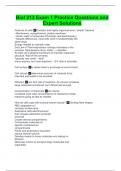
-
Biol 213 Exam 1 Practice Questions and Expert Solutions
- Exam (elaborations) • 13 pages • 2024
- Available in package deal
-
- R181,31
- + learn more
Features of cells Complex and highly organized even "simple" bacteria • Membranes, compartments, protein machines. • Small, realm of molecules (Chemistry and biochemistry) • Despite differences, most cells work in fundamentally the same ways Energy needed to maintain order 2nd Law of Thermodynamics--entropy increases in the universe. Spontaneous drive: Order --> disorder. All cells use a plasma membrane to maintain organized structure. Wall off the universe. Typically very s...
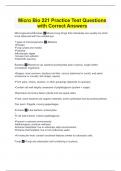
-
Micro Bio 221 Practice Test Questions with Correct Answer
- Exam (elaborations) • 11 pages • 2024
- Available in package deal
-
- R181,31
- + learn more
Microorganisms/Microbes Minute living things that individually are usually too small to be observed with the unaided eye 7 types of microorganisms •Bacteria •Archaea •Fungi (yeast and molds) •Protozoa •Microscopic algae •Viruses (non-cellular) •Helminths (worms) Bacteria •Bacterium (pl. bacteria) prokaryotes (lack nucleus), single celled (unicellular) organisms. •Shapes: most common: bacillus (rod-like), coccus (spherical or ovoid), and spiral (corkscrew or curved); star-sha...

-
Stahl’s Essentials of PsychoPharm Quiz 1 – With Questions & Answers (Graded A+)
- Exam (elaborations) • 10 pages • 2024
- Available in package deal
-
- R175,86
- + learn more
Stahl’s Essentials of PsychoPharm Quiz 1 – With Questions & Answers (Graded A+) Stahl’s Essentials of PsychoPharm Quiz 1 – With Questions & Answers (Graded A+) neurons - ANSWER - cells of chemical communication within the brain. have many sizes, shapes and lengths that determine function. localization in brain also affects function when neurons malfunction - ANSWER - behavioural symptoms occur that may improve or worsen with drugs general structure of a neuron - ANSWER - dendri...
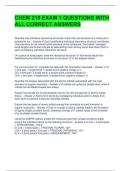
-
CHEM 219 EXAM 1 QUESTIONS WITH ALL CORRECT ANSWERS
- Exam (elaborations) • 4 pages • 2024
-
- R201,27
- + learn more
CHEM 219 EXAM 1 QUESTIONS WITH ALL CORRECT ANSWERS Describe how individual resonance structures impact the true structure of a molecule or polyatomic ion. - Answer Each contributing individual resonance structure contributes characteristics to the overall hybrid structure of the compound. The hybrid "averages" bond lengths and formal charges by delocalizing them among atoms that share them in each contributing individual resonance structure. On a piece of scrap paper, draw the resonance s...

R115 for your summary multiplied by 100 fellow students... Do the math: that's a lot of money! Don't be a thief of your own wallet and start uploading yours now. Discover all about earning on Stuvia


